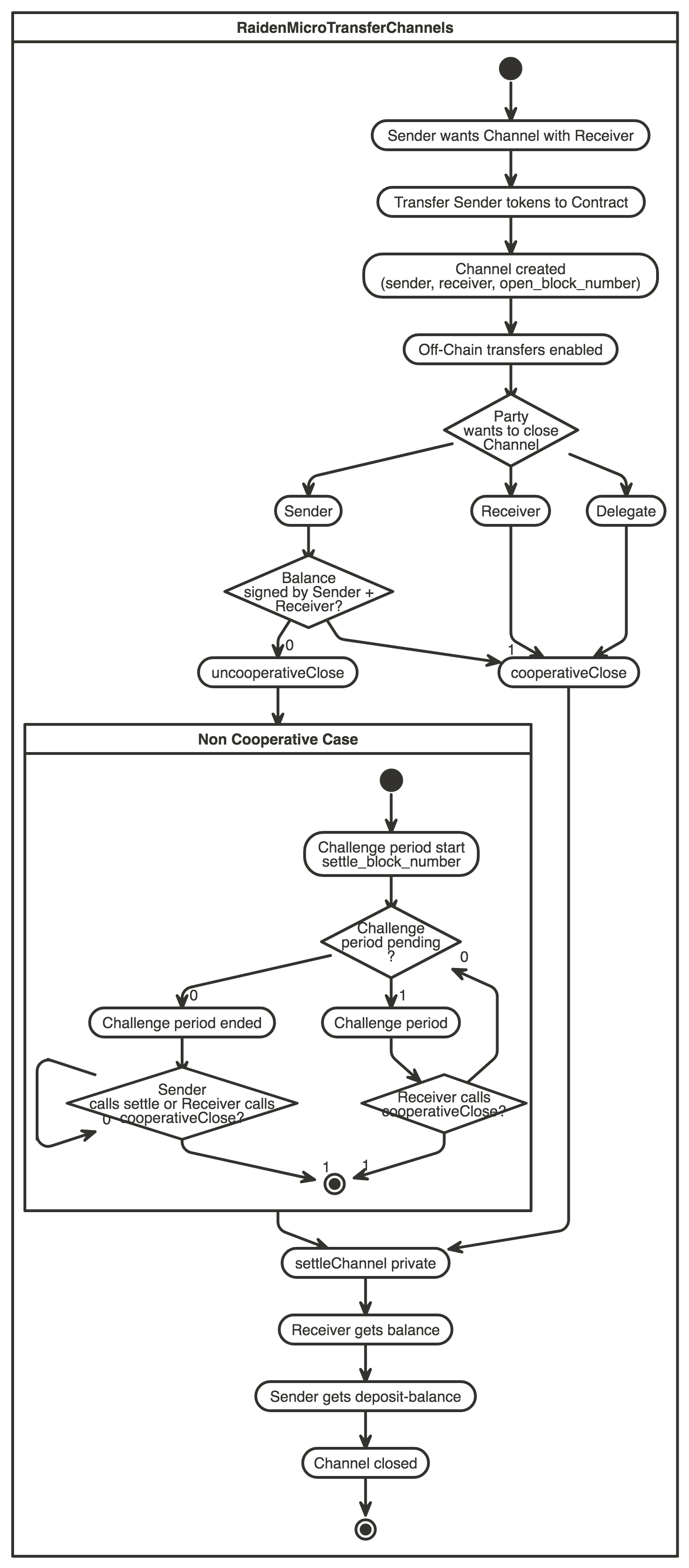Smart Contract¶
Smart Contracts, Unittests and Infrastructure for RaidenPaymentChannel
Installation¶
The Smart Contracts can be installed separately from the other components.
Setup¶
pip install -r requirements.txt
Usage¶
- from
root/contracts:
# compilation
populus compile
# tests
pytest
pytest -p no:warnings -s
pytest tests/test_uraiden.py -p no:warnings -s
# Recommended for speed:
# you have to comment lines in tests/conftest.py to use this
pip install pytest-xdist==1.17.1
pytest -p no:warnings -s -n NUM_OF_CPUs
Deployment¶
Chain setup for testing¶
Note - you can change RPC/IPC chain connection, timeout parameters etc. in project.json
privtest¶
- Start the geth-node from the commandline:
geth --ipcpath="~/Library/Ethereum/privtest/geth.ipc" \ --datadir="~/Library/Ethereum/privtest" \ --dev \ ---rpc --rpccorsdomain '\*' --rpcport 8545 \ --rpcapi eth,net,web3,personal \ --unlock 0xf590ee24CbFB67d1ca212e21294f967130909A5a \ --password ~/password.txt # geth console # you have to mine yourself: miner.start() geth attach ipc:/Users/loredana/Library/Ethereum/privtest/geth.ipc
kovan¶
- Get some testnet-Ether at the kovan-faucet
- Modify the project.json to change the default account
- Start the Parity node from the commandline:
parity --geth \ --chain kovan \ --force-ui --reseal-min-period 0 \ --jsonrpc-cors http://localhost \ --jsonrpc-apis web3,eth,net,parity,traces,rpc,personal \ --unlock 0x5601Ea8445A5d96EEeBF89A67C4199FbB7a43Fbb \ --password ~/password.txt \ --author 0x5601Ea8445A5d96EEeBF89A67C4199FbB7a43Fbb
ropsten¶
- Get some testnet-Ether at the ropsten-faucet
- Modify the project.json to change the default account
- Start the geth node from the commandline:
geth --testnet \
--rpc --rpcport 8545 \
--unlock 0xbB5AEb01acF5b75bc36eC01f5137Dd2728FbE983 \
--password ~/password.txt
rinkeby¶
- Get some testnet-Ether at the rinkeby-faucet
- Modify the /contracts/project.json to change the default account
Fast deployment¶
There are some scripts to provide you with convenient ways to setup a quick deployment.
# Fast deploy on kovan | ropsten | rinkeby | tester | privtest # Following two calls are equivalent python -m deploy.deploy_testnet # --owner is web.eth.accounts[0] python -m deploy.deploy_testnet \ --chain kovan \ --owner 0x5601Ea8445A5d96EEeBF89A67C4199FbB7a43Fbb \ --challenge-period 500 \ --token-name CustomToken --token-symbol TKN \ --supply 10000000 --token-decimals 18 # Provide a custom deployed token python -m deploy.deploy_testnet --token-address TOKEN_ADDRESS
API¶
Generated docs¶
There is a Auto-Generated-API, that is compiled with soldocs.
Prerequisites
pip install soldocs
populus compile
soldocs --input build/contracts.json --output docs/contract/RaidenMicroTransferChannels.md --contracts RaidenMicroTransferChannels
Opening a transfer channel¶
ERC223 compatible (recommended)¶
Sender sends tokens to the Contract, with a payload for calling
createChannelPrivate.
Token.transfer(_to, _value, _data)
Gas cost (testing): 88976
_to=Contract.address_value= deposit value (number of tokens)_datacontains the Sender and Receiver addresses encoded in 20 bytes- in python
_data = bytes.fromhex(sender_address[2:] + receiver_address[2:])
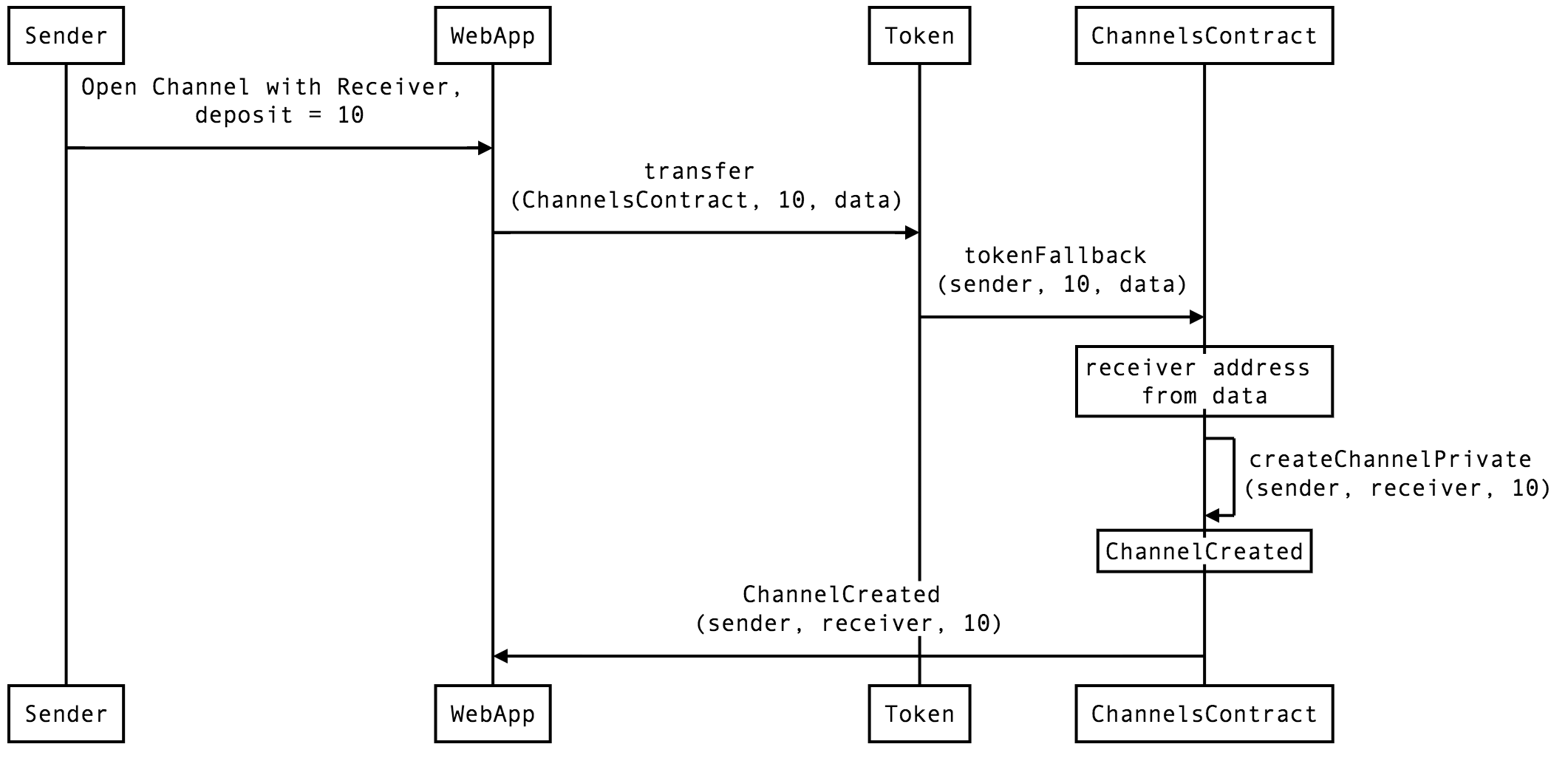
ERC20 compatible¶
# approve token transfers to the contract from the Sender's behalf
Token.approve(contract, deposit)
Contract.createChannel(receiver_address, deposit)
Gas cost (testing): 120090
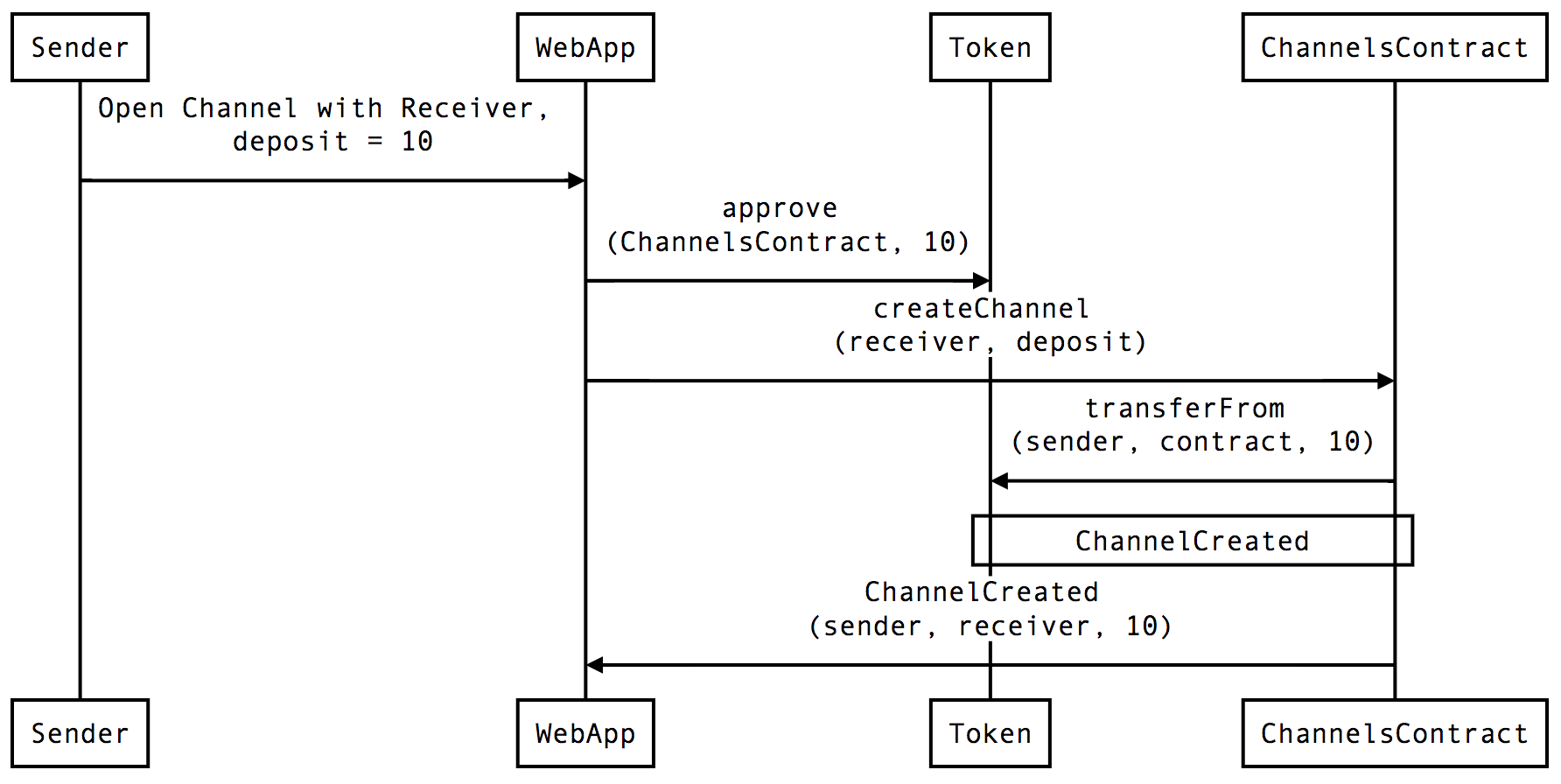
Topping up a channel¶
Adding tokens to an already opened channel.
ERC223 compatible (recommended)¶
Sender sends tokens to the Contract, with a payload for calling
topUp.
Token.transfer(_to, _value, _data)
Gas cost (testing): 54885
_to=Contract.address_value= deposit value (number of tokens)_datacontains the Sender and Receiver addresses encoded in 20 bytes + the open_block_number in 4 bytes- in python
_data = sender_address[2:] + receiver_address[2:] + hex(open_block_number)[2:].zfill(8)
_data = bytes.fromhex(_data)
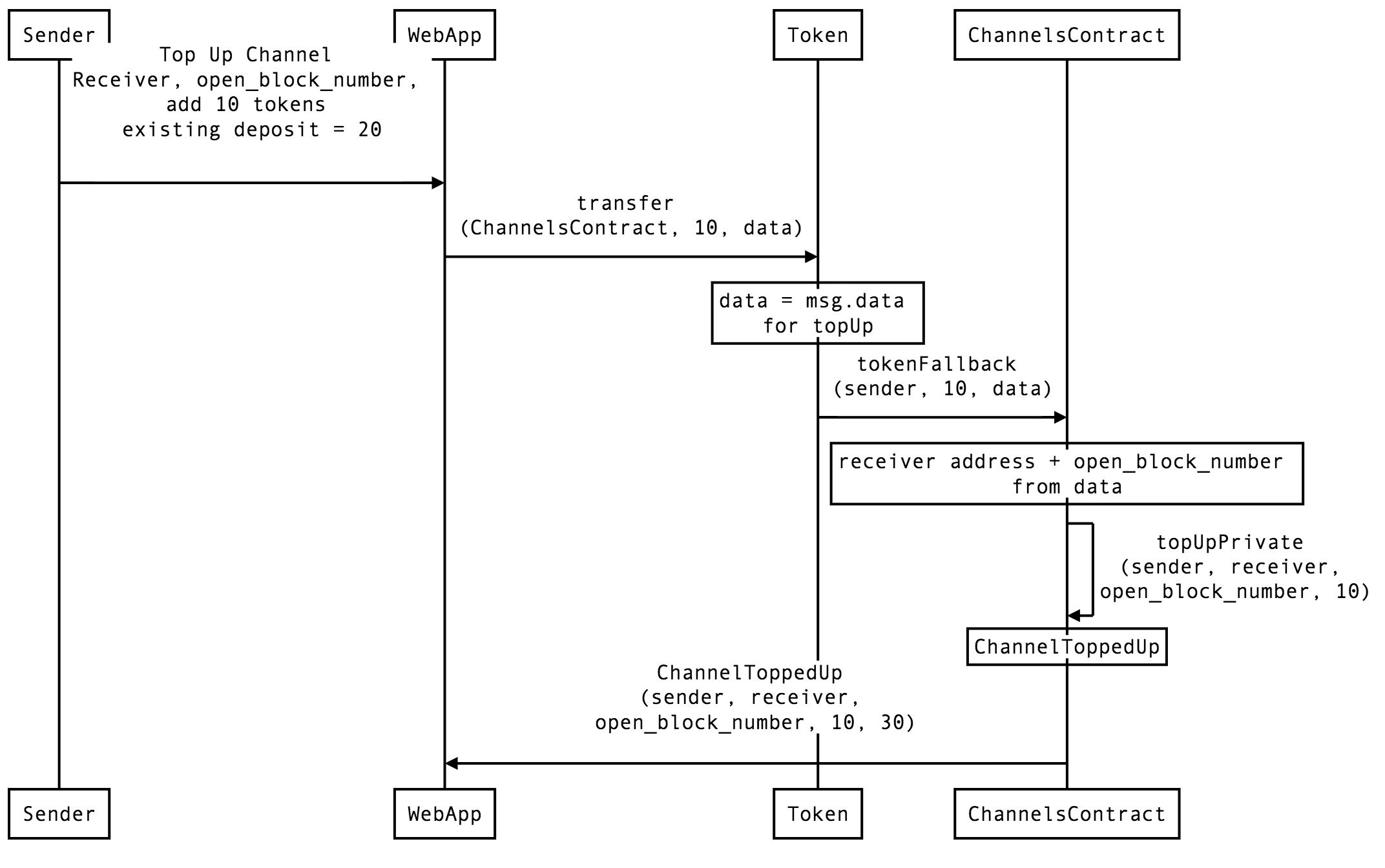
ERC20 compatible¶
#approve token transfers to the contract from the Sender's behalf
Token.approve(contract, added_deposit)
# open_block_number = block number at which the channel was opened
Contract.topUp(receiver_address, open_block_number, added_deposit)
Gas cost (testing): 85414
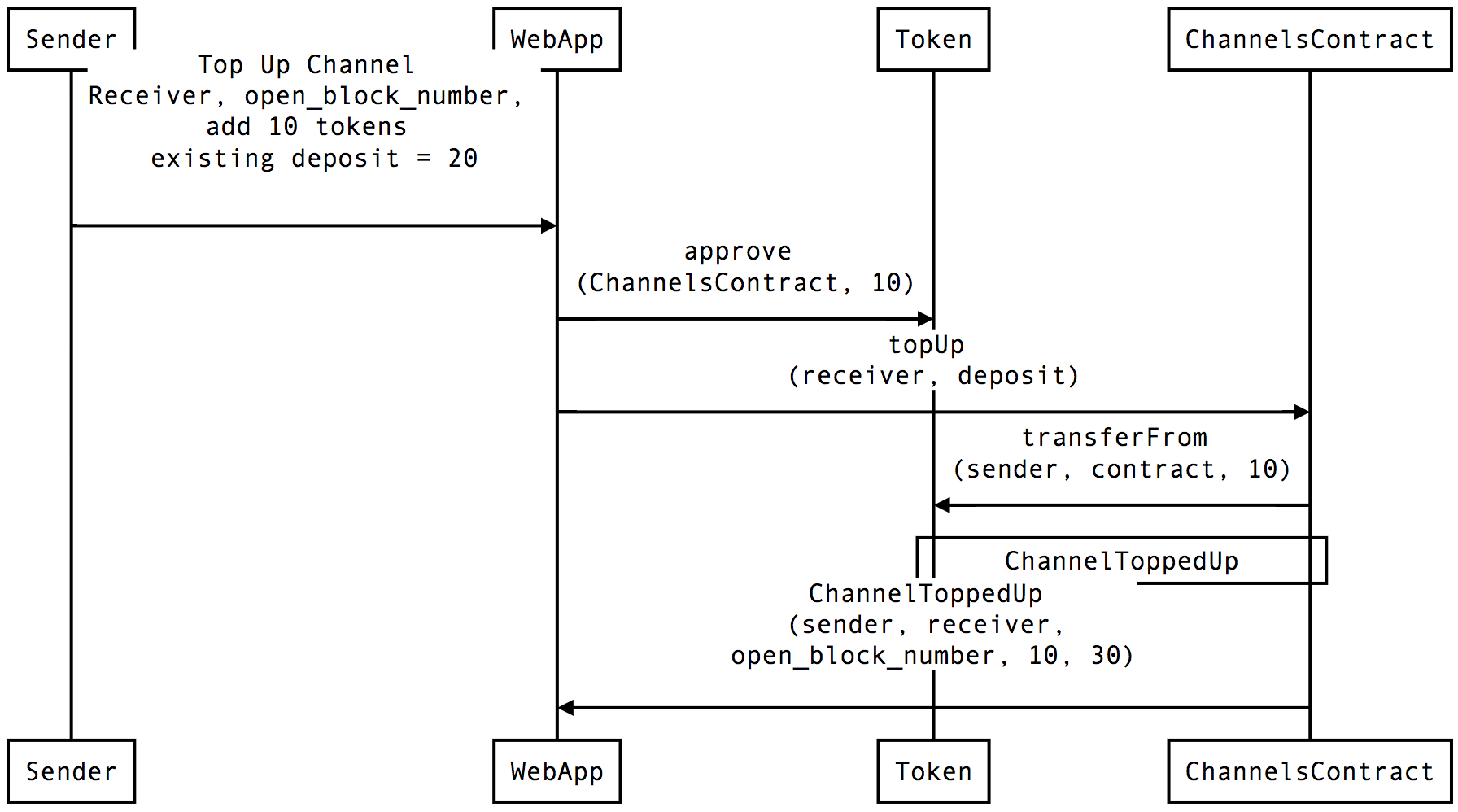
Generating and validating a balance proof¶
(to be updated post EIP712)
# Sender has to provide a balance proof to the Receiver when making a micropayment
# The contract implements some helper functions for that
# Balance message
bytes32 balance_message_hash = keccak256(
keccak256(
'string message_id',
'address receiver',
'uint32 block_created',
'uint192 balance',
'address contract'
),
keccak256(
'Sender balance proof signature',
_receiver_address,
_open_block_number,
_balance,
address(this)
)
);
# balance_message_hash is signed by the Sender with MetaMask
balance_msg_sig
# Data is sent to the Receiver (receiver, open_block_number, balance, balance_msg_sig)
Generating and validating a closing agreement¶
from eth_utils import encode_hex
# Sender has to provide a balance proof to the Contract and
# a closing agreement proof from Receiver (closing_sig)
# closing_sig is created in the same way as balance_msg_sig, but it is signed by the Receiver
# Closing signature message
bytes32 balance_message_hash = keccak256(
keccak256(
'string message_id',
'address sender',
'uint32 block_created',
'uint192 balance',
'address contract'
),
keccak256(
'Receiver closing signature',
_sender_address,
_open_block_number,
_balance,
address(this)
)
);
# balance_message_hash is signed by the Sender with MetaMask
balance_msg_sig
# balance_msg_sig is signed by the Receiver inside the microraiden code
closing_sig
# Send to the Contract (example of collaborative closing, transaction sent by Sender)
Contract.transact({ "from": Sender }).cooperativeClose(
_receiver_address,
_open_block_number,
_balance,
_balance_msg_sig,
_closing_sig
)
Balance proof / closing agreement signature verification:¶
sender_address = Contract.call().extractBalanceProofSignature(receiver_address, open_block_number, balance, balance_msg_sig)
receiver_address = Contract.call().extractClosingSignature(sender_address, open_block_number, balance, closing_sig)
Closing a channel¶
# 1. Receiver calls Contract with the sender's signed balance message = instant close & settle
# 2. Client calls Contract with receiver's closing signature = instant close & settle
# Gas cost (testing): 71182
Contract.cooperativeClose(receiver_address, open_block_number, balance, balance_msg_sig, closing_sig)
# 3. Client calls Contract without receiver's closing signature = challenge period starts, channel is not settled yet
# Gas cost (testing): 53876
Contract.uncooperativeClose(receiver_address, open_block_number, balance)
# 3.a. During the challenge period, 1. can happen.
# 3.b. Client calls Contract after settlement period ends
# Gas cost (testing): 40896
Contract.settle(receiver_address, open_block_number)
